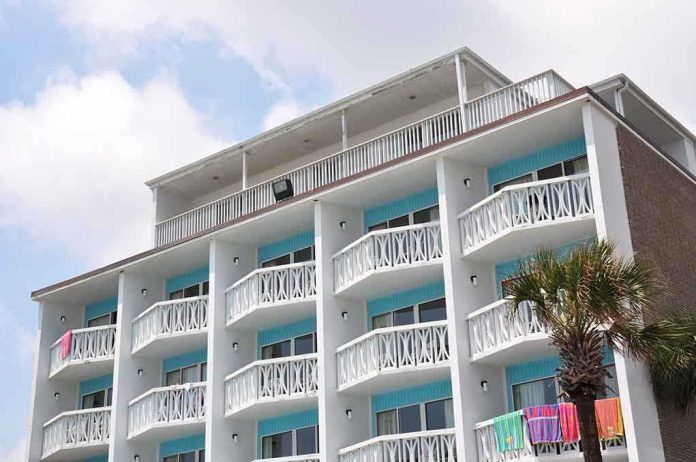
A Miami hotel’s decision to replace its American front desk with a remote receptionist based in India has sparked a national debate over outsourcing, automation, and the erosion of U.S. jobs—striking at the heart of concerns about American sovereignty and economic security.
Story Snapshot
- Viral video shows Miami hotel using a virtual front-desk receptionist reportedly located in India, igniting backlash about outsourcing American jobs.
- Public outrage highlights deep anxieties over job security, automation, and the impact of global labor markets on U.S. workers.
- The incident reflects a broader trend of remote technology adoption in hospitality, raising questions about the future of in-person service roles.
- No official response from the hotel or technology provider as social media debate intensifies and scrutiny grows.
Viral Video Sparks National Debate Over Outsourcing
On August 3, 2025, social media user Pete Langs posted a video showing his check-in at a Miami hotel where, instead of finding a traditional front desk attendant, he was greeted by a virtual receptionist appearing via video call. The employee, reportedly based in India, handled the check-in process remotely, triggering widespread outrage online. By August 4, the video had gone viral, with users on platforms like X (formerly Twitter) and Instagram condemning the outsourcing of American hospitality jobs and voicing concerns about automation and the loss of face-to-face service. The story quickly gained traction, fueled by fears that this model might become the new norm for U.S. hotels.
The Miami hotel’s decision to use a virtual, overseas front desk employee exemplifies a growing trend in the hospitality industry: leveraging remote and automated solutions to cut costs. Since the COVID-19 pandemic, hotels have increasingly turned to technology to address staffing shortages and reduce expenses. Outsourcing roles to countries like India, which offers a large English-speaking workforce at lower wages, has been common in call centers and IT support for decades, but bringing this model into guest-facing positions is a relatively new—and highly controversial—development. Miami, a competitive tourist market, now finds itself at the center of a debate over whether such practices undermine American workers and traditional service standards.
Concerns Over Job Security and American Values
The backlash against the Miami hotel underscores deep anxieties among U.S. workers and their supporters regarding job security, wage stagnation, and the future of American employment. Many Americans see the outsourcing of front-desk roles as a direct threat to local jobs and a symptom of unchecked globalism, which prioritizes corporate cost savings over national interests. Critics argue that replacing in-person staff with remote workers thousands of miles away erodes the quality of service, damages the guest experience, and ultimately weakens the social fabric that binds local communities. The rapid, polarized reaction on social media highlights how the issue has tapped into broader concerns about government overreach, immigration, and the preservation of conservative values in the face of economic and technological disruption.
The controversy also raises constitutional and regulatory questions, as some observers call for policy intervention to protect domestic employment and prevent the offshoring of service sector jobs. While hotels cite operational efficiency and the need to address labor shortages, critics demand greater transparency and accountability from businesses that benefit from the U.S. market yet outsource jobs abroad. The power dynamics at play reveal that hotel executives and technology providers hold the decision-making authority, while American workers and concerned citizens have limited influence except through public pressure and potential legislative action.
Industry Impact and Ongoing Uncertainty
In the immediate aftermath of the viral video, the Miami hotel has faced negative publicity and growing scrutiny of its employment practices. Social media remains deeply divided, with some users defending the practice as a necessary adaptation to economic reality and others decrying it as unpatriotic and harmful to American workers. Industry analysts predict this incident may accelerate the adoption of remote and automated guest services across other hotels, unless public backlash or regulatory intervention forces a reassessment. The long-term implications include potential changes to industry standards, increased polarization over globalization, and further debate about the balance between innovation, cost efficiency, and the protection of domestic jobs and values.
Major hotel chain faces backlash for allegedly outsourcing check-ins — to India https://t.co/vjlFESqFOp pic.twitter.com/124GtcxmCY
— New York Post (@nypost) August 5, 2025
As of August 6, 2025, the hotel continues to use its virtual receptionist, and the story remains in the spotlight with no official statement from management or the outsourcing provider. The rapid spread of the video and the intensity of the response demonstrate the powerful role of social media in shaping public opinion and holding businesses accountable for practices seen as contrary to American interests. While automation and global labor markets are likely to keep expanding, this controversy has made clear that the American public is watching—and demanding answers when core values and livelihoods are perceived to be at risk.
Sources:
Hire Americans: Miami hotel slammed for outsourcing front desk to India
US hotel’s virtual Indian receptionist sparks job outsourcing debate
Instagram: Original video of Miami hotel virtual receptionist
Indian-origin man acting as virtual receptionist at US hotel, video goes viral



